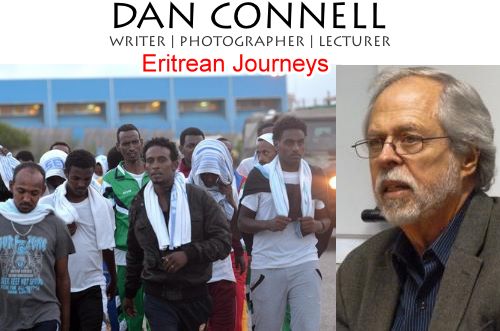Eritrea: Eritrean Journeys
Eritrean Journeys
Thousands of Eritreans have fled a harsh dictatorship over the past decade, making the new nation one of the world’s largest per capita producers of refugees. To reach a safe haven they risk capture and imprisonment in Eritrea, kidnapping and torture by human traffickers, anonymous deaths on perilous desert and sea crossings, and more. Then comes the disheartening struggle to gain asylum in countries looking for an excuse to refuse them refugee status. Yet still they come. These are their stories, with names changed at their request out of fear of retribution against their families.
Nov 08, 2014
Mohamed survived a desert crossing and a last-second sea rescue only to get stuck in a camp outside Calais known as "the jungle" with no idea where to go next.
Oct 30, 2014
Harassed and threatened for practicing his religion, Islam, Mussa fled to Sudan, flew to Turkey, caught a boat to Greece, and walked through the Balkans.
Oct 25, 2014
When Saba's husband fled his national service, she was threatened with arrest. As she had no idea where he was, she left to find him, only to be kidnapped, robbed, & abused in Libya, which had descended into anarchy.
Oct 24, 2014
Abinet quietly served her country for six years, but when she joined a banned church, she was arrested, interrogated, threatened, released, and then shadowed in a clumsy attempt to identify other congregants.
Sep 09, 2014
Fessahaye spent 18 years in National Service, but declined to join the ruling party and paid the price.
Sep 02, 2014
Two weeks after Abdu asked why the G-15 dissidents were imprisoned without a trial he was wakened in the middle of the night, handcuffed, put in a car with a bag over his head, and taken to a secret prison for interrogation.
Aug 10, 2014
When Tesfai's brother fled national service, he was taken to prison as "a kind of hostage." Four years later he escaped.
Aug 07, 2014
False accusations of complicity in a cousin's failed escape led to Girmay's imprisonment and beatings—and his flight from Eritrea.
Aug 05, 2014
When Bereket's father died, he stayed home to help his family and returned a month late to National Service. It cost him his freedom.


![[AIM] Asmarino Independent Media](/images/logo/ailogo.png)
